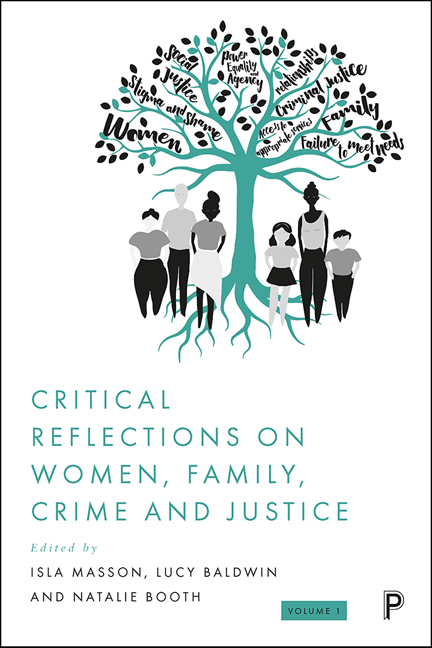Book contents
- Frontmatter
- Contents
- List of figures
- Notes on the contributors
- Acknowledgements
- Foreword: critical reflections from the Women, Family, Crime and Justice network
- 1 Starting the conversation: an introduction to the Women, Family, Crime and Justice network
- 2 Playing the game: women and community punishment
- 3 Harmful social and cultural practices that exist within South Asian communities in the UK and their impact on women
- 4 Exploring shame, love and healing within women’s recovery: an analysis of a trauma-specific intervention
- 5 Reducing the enduring harm of short terms of imprisonment
- 6 ‘Without it you’re lost’: examining the role and challenges of family engagement services in prisons
- 7 What are the challenges and opportunities for schools in supporting children of people in prison?
- 8 Impact and engagement work in the context of families of people in prison
- 9 Presence, voice and reflexivity in feminist and creative research: a personal and professional reflection
- 10 Service users being used: thoughts to the research community
- 11 Continuing the conversation: reflections from the Women, Family, Crime and Justice network
- Index
1 - Starting the conversation: an introduction to the Women, Family, Crime and Justice network
Published online by Cambridge University Press: 21 December 2021
- Frontmatter
- Contents
- List of figures
- Notes on the contributors
- Acknowledgements
- Foreword: critical reflections from the Women, Family, Crime and Justice network
- 1 Starting the conversation: an introduction to the Women, Family, Crime and Justice network
- 2 Playing the game: women and community punishment
- 3 Harmful social and cultural practices that exist within South Asian communities in the UK and their impact on women
- 4 Exploring shame, love and healing within women’s recovery: an analysis of a trauma-specific intervention
- 5 Reducing the enduring harm of short terms of imprisonment
- 6 ‘Without it you’re lost’: examining the role and challenges of family engagement services in prisons
- 7 What are the challenges and opportunities for schools in supporting children of people in prison?
- 8 Impact and engagement work in the context of families of people in prison
- 9 Presence, voice and reflexivity in feminist and creative research: a personal and professional reflection
- 10 Service users being used: thoughts to the research community
- 11 Continuing the conversation: reflections from the Women, Family, Crime and Justice network
- Index
Summary
Introduction
‘There can be few topics that have been so exhaustively researched to such little practical effect as the plight of women in the criminal justice system.’ (Corston, 2007, p 16)
A significant amount of attention has been paid to the challenges facing women in the criminal justice system (CJS) and, more recently, towards families affected by imprisonment. While research and policy interest in these overlapping areas is evident, it is disheartening to say that much-needed change has been slow to be actualised. It often feels as if we are going round in circles.
The three editors of this collection have aired concerns about the ineffectual ‘promise’ of change following the publication of the Female Offender Strategy by the Ministry of Justice (MoJ) in England and Wales in 2018 (Booth et al, 2018). While our concerns remain as strong today as they did at the time of writing that piece, it is clear to us that many of the problems lie with the social injustices that comprise our neoliberal and patriarchal society. Repeatedly, issues pertaining to housing, education, poverty, mental health, addiction and abuse are identified as factors constituting the inadequate social circumstances that women and families in contact with the CJS have had to negotiate, often throughout their lives. Therefore, in spite of the ever-growing body of evidence within these areas, sadly significant social injustices persist.
Fortunately, continually challenging these injustices is the vital work of researchers, academics, activists and practitioners. Their strong commitment for change intends to illuminate, respond and reduce, and ideally remove, damaging issues for women and families affected by the CJS. Acknowledging this, the Women, Family, Crime and Justice (WFCJ) research network was launched by the editors in April 2018 to provide a collaborative space to bring together like-minded people from research, practice and academia, to critically discuss, disseminate and address some of these injustices.
Convening the WFCJ network
Prior to our initial meeting, the three editors were each working in related fields, and were pleased to realise the overlap in research interests; bonding over a passion to make a difference. Due to structural pressures in higher education prioritising competition and novelty over collaboration, we recognised that often those with similar research interests feel they must compete with each other, and sometimes tread on each other, rather than working together for the benefit of WFCJ-related areas.
- Type
- Chapter
- Information
- Publisher: Bristol University PressPrint publication year: 2021

